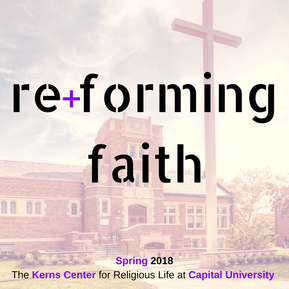 This semester, the guiding theme for Embrace Ministries is “Re+Forming Faith.” Over the past year, Lutherans have been awash in the 500th anniversary of Luther’s Reformation. Concerts, educational events, celebrations, commemorations, and yes, even lamentations marked the 500 years since Luther produced the 95 Theses (whether they were actually nailed to a door is disputed). This historical focus provided an invaluable grounding in our theological heritage and enlightened many outside the tradition to why Luther’s movement to reform the church eventually changed the entire world. Yet, as the drivers of our lives, we cannot leave our focus in the rearview mirror. We must look forward, to the car we drive and the road ahead. So, springing from that history, it’s now time to attend to the present and future of the church. From within the reformation traditions, God’s Spirit calms us to be an actively reforming church. Karl Barth popularized the phrase ecclesia reformata semoer reformanda - the church, reformed and reforming - as a clarion call to this posture of expectant formation. What does it mean for us at Capital University that we're "Re+Forming Faith"? It means that God calls us to be reforming, evolving people. The form of the verbs, the -ing at the end of reform and evolve, suggests both activity and purpose. Our identity as church isn’t static. You're likely not shocked to hear that we're not perfect, and imperfection always leaves room for growth into what we're supposed to be. God's church, at our best, is dynamic as we continue to grow in God’s image. Transformation ought to be the personal and communal norms of Christianity. The “R” in Re+Forming, which unsurprisingly stands for reform, implies purposeful change. It’s not just random, but instead is change with a goal in mind. Luther wanted to recenter the heart of Christianity: we experience salvation by God’s grace, through faith, apart from works of the law. His reforms intended (sometimes accomplished, at other times most certainly not) to lift up this centrality belief about God and about our being as Christians, which would then reform our own home lives, political behaviors, work activity, and theological action. The “E,” evolution, borrows from more recent reforms in science. Evolution here simply means growing in the capacity for life to thrive. The logic behind the theory of evolution is just that: the species that adapt and live more abundant life because of that adaptation do more than just survive; they thrive. An evolving faith looks to the purpose of reform and uses the metric of God's abundant life as the plumb line of our evolution. There's at least one problem with the evolution we've observed in nature, however. Namely, it focuses only on the individuals thriving and the survival of the species. In faith, we're called to the kind of transformation that helps all creatures thrive, that promotes abundant life for all creation. How do we practice that kind of faith? That's the focus of our entire semester. You can follow along here on this blog for more reflections throughout the semester. If you're in the Columbus area, come check out Capital Worship Wednesdays at 10:05AM or Candlelight Worship on Thursdays at 9:09PM, both in the Kerns Religious Life Center. We'll also focus on this at our Monday Mindfulness and Meditation event, a time for interfaith devotion, each Monday at 12:30PM. Use the comments or social media for reflections on where you see a need for evolving or reforming in the church or in your own spiritual life. Until we meet again, may you find the abundant life God's opened to you.
0 Comments
Leave a Reply. |
AuthorSimultaneously a sinner and a saint. Archives
September 2020
Categories |
 RSS Feed
RSS Feed